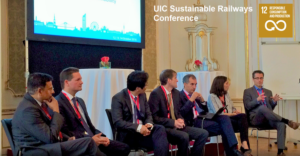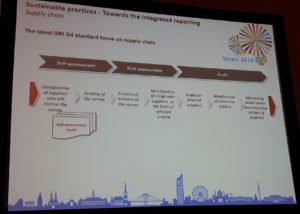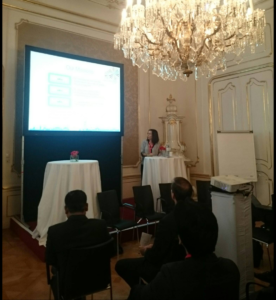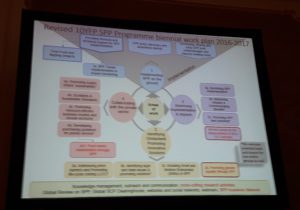UIC, the International Railway Union, expands from ‘environmentally responsible’ to ‘sustainable’, from trains and stations to supply chains

The sustainability leaders in the railway industry gathered in Vienna last week at the 13th UIC (International Union of Railways) Sustainability Conference to present the latest developments in sustainability and exchange ideas. In addition to participating in the panel on Sustainable Procurement on day two, I was able to catch a few other sessions which set the context for how UIC and their railway business members are engaging in sustainability, and the clear opportunity for this industry to expand efforts to collaborate on sustainable procurement.
With the theme of the conference being “Efficient Power Toward Sustainability” there remains a heavy focus on environmental impact, as well as safety. A rich range of topics on innovations for using sustainable energy and improving impacts such as a wind-powered rail line, a virtual-reality style Mobile App for helping conductors modify driving behavior to save up to 20% in fuel, to use of biodiesel in locomotives.
The session on “GRI G4 Reporting: challenges for rail sector” provoked some contrasting opinions on the mode in which “extra-financial sustainability reporting” is really implemented within an organization. On one hand, a
practitioner from a national railway explained how they have embraced the GRI framework and translated the sustainability criteria and KPIs into Euros, so everything is evaluated on the same ‘currency’. Achieving this allows them to use this “full criteria” framework as a guide for how they approach new projects and grow their business. Next, a sustainable investment advisor stated he was duly impressed with this feat, and flatly rejected the idea that CEOs across other industries would ever use a GRI-like framework as a ‘dashboard for steering their business.’ He praised the railway industry as an ‘ideal fit’ for long-term sustainable investors (who have few options to create positive returns in these days of negative interest rates). He was baffled why more rail companies have not sought investment on the global institutional market using their sustainability credentials, as they could save significantly on interest rates.
EcoVadis joined the panel on day two “Sustainable procurement in the rail sector: taking larger strides and
leapfrogging along the sustainability path”, moderated by Sanjay Kumar, DFCCIL, Government of India Ministry of Railway.
Here’s a brief summary of some of the takeaways:
- Dr Cheul Lee, Korea Rail Research Institute (KRRI)/UIC talked in detail about his research on lifecycle
analysis of various railway elements including rolling stock, track, and station construction. Use of lifecycle perspectives and in particular life cycle costing in procurement decisions can have significant impact on sustainability outcomes and should be encouraged, and the elements have emerged upon which common methodologies can be developed. - Amandine Noureldin of Alstom presented the strong progress of Railsponsible, the collaborative initiative rail sector which is working to improve sustainability outcomes of rail industry supply chains (including both operators and manufacturers). Solidly established with six founders, and having added a seventh member recently, Railsponsible is showing successful results in monitoring supplier sustainability using the Ecovadis platform. They are looking forward to working with the UIC to grow this initiative.

- Dr. Farid Yaker, Programme Officer, Sustainable Public Procurement (SPP), UNEP, brought an update on UNEP’s 10 year Framework of Programs (10YFP) aimed at accelerating the shift to sustainable procurement at world level through the establishment of a global collaborative platform. The strengthening of links to private sector initiatives such as Railsponsible and their participation in a global UN endorsed framework such as the 10YFP on SPP will accelerate both efforts.
- Legal framework that controls public procurement currently make it complicated for public entities to make use of common rating standards of suppliers. But public entities must adapt so they can make use of these evaluation standards for suppliers, who may well be supplying private and public sector clients, and goods and services that ultimately serve the same populace.
- Also speaking were James Cadman of Action Sustainability in the UK, and Ferdinand Zinsmeister, Procurement, ÖBB-Infrastruktur AG

On a high note, at the gala dinner, our friend Sanjay Kumar of the Indian Railway won the “Social Impact” award for his “project Saksham” which provided extensive job training and placement to people displaced by railway development. That was a positive note on which to conclude!
You might also like:
How ‘Together for Sustainability’ Drives Supply Chain Sustainability in the Chemical Industry

